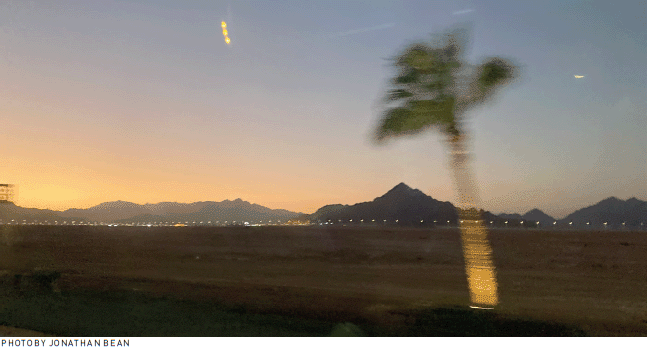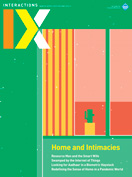Authors:
Jonathan Bean
For someone initially skeptical about the reach of a voice assistant into my own home, I am embarrassed to count the number of microphones lying in wait for my next command. A pair of smart speakers, recently upgraded in pursuit of better sound, sit on a bookshelf in the living room. I can talk to my TV, robot vacuum, microwave, thermostat, air filter, and, as of a few months ago, all the lights in the main living area of the house. I have become absolutely accustomed to this new state of affairs. I won't call it convenience or ease because, as I've documented in past columns, it's taken a fair amount of work and frustration, not to mention continuing financial costs, to maintain this kind of Jetsons-style home life.
Each widget, each bit of interconnectedness, bestows its own new needs upon me and my home. I recently replaced my first robot vacuum with one that can respond to voice commands. I'm not thrilled that it's doing so while also uploading a floor plan of my house to a private corporation, but of course, I still bought it. It reminded me of a conversation I had with my late grandmother, who worked for more than 40 years at Walmart. She recalled the sense of horror that people at her church expressed when it was announced the store would be open on Sundays and holidays. Those who protesteth too much, she said with a rare, wry smile, were the same who pileth their carts the highest on the holiest of days.
Putting the issue of consumer sanctimony aside, did I mention that I have a 50-pound mutt who sheds? I'm more than happy to shelve any qualms about corporate overreach in exchange for being able to simply verbalize my desire for dog fur to disappear from under the dining table. Pet owners, I share with you true joy: clean floors on command. But the new vacuum begat a new annoyance. All the extra cleaning means the waste bin needs to be emptied even more frequently than before, a dusty task that I'm inclined to put off until the device boycotts its cleaning duties with a petulant tone and an insistent call to "empty dustbin." Wait a minute—isn't it me who's supposed to be issuing the commands in this relationship?
And, as it is with all this Internet-enabled stuff at home, it really is a relationship [1,2], one that is knowingly nurtured by those behind the scenes in the hopes of making us better consumers. A few weeks after getting his own smart speaker, my 70-something father called me with the sole purpose of reporting that he'd said "thank you" and the device had replied with an enthusiastic "you bet!" The colloquial language charmed my dad and cemented the role of the device in his home. Delight comes at the cost of privacy, however; as was reported in a widely published AP story, thousands of Amazon workers are listening to recordings to help fine-tune the AI that makes a smart speaker seem, well, smart [3].
Initially, my resistance to all this stuff was loosely centered on privacy. I hear this sentiment a lot from other people, often articulated in a joking way, along the lines of, "Oh, I don't care if they're watching or listening to me—they're going to get really bored!" I don't have a particularly interesting or scandalous life, at least from my own perspective, but I'd still prefer to think that I am guaranteed absolute privacy within the walls of my own home. I know that's not the case, however. In addition to the floor-plan-uploading vacuum, I recently learned that the WiFi camera my partner purchased to keep an eye on the fig tree and watering system when we're away can be hacked. That didn't cause me much concern when it was outside, but once we realized the camera contained a small speaker, it quickly moved inside, smack in the middle of our main living space. Its new life was to monitor the living room for movement, in order that our just-smart-enough dog, who had learned it was absolutely okay to get on the furniture as long as we weren't home (did I mention the shedding issue?), could be scolded remotely. It worked for a few months, but eventually our dog learned that sometimes our voices could be heard when we were not at home, and in that case it was still fine to snooze on the couch.
I am embarrassed to count the number of microphones lying in wait for my next command.
I'm not concerned about someone spying on the fig tree, or even the dog, but I don't like the idea that someone might be watching me, no matter how remote the chances. So, when the indoor camera has been in use, I unplug it immediately upon returning home. I also place the unplugged device so the lens is flat against a tabletop—a move that, while from one perspective is completely irrational, has the symbolic virtue of indicating to visitors that they are not being surveilled, at least not by a camera. The smart speakers, however, are always on.
 | Staging, recycling, and more security: behind the perimeter wall at COP27. |
 | Between the pavilion buildings at COP27. |
Several recent experiences have started to shift my thinking about my own enthusiastic embrace of domestic technology. First was a trip to Egypt to attend the UN Climate Conference, where the issue of surveillance was foregrounded by stark warnings not to install a phone app developed by the Egyptian government [4]. The app was supposed to simplify every aspect of the trip—booking a taxi, checking into the hotel, navigating the bus system, getting a Covid test—but required a passport number and was reported to gain full access to your phone's file system and contact list. Large areas of Sharm el-Sheikh, the seaside resort city hosting the 30,000 people attending the conference, had clearly been bulldozed in preparation, presumably to increase security at the venue and nearby airport. Men in suits stood guard every 500 feet in vast areas of desert that still bore bulldozer tracks in the dust from being scraped flat. Walking back to my hotel from the bus stop required passing through three security checkpoints. I know this is standard operating procedure in many places, but as someone accustomed to freedom of movement and to surveillance that is either well concealed or operating at my behest, like the dog camera, I found the experience deeply unsettling.
Second, as someone who is concerned about the impacts of climate change on the world's people, I and many others were struck by what can only be described as the greenwashing at and around the conference. The sustainable hotel that the government-run tourism bureau suggested to me and hundreds of other conference delegates was built around an enormous water park—a use of fresh water that seems less than sustainable in the middle of a large desert. The catering at the conference itself was sponsored by Coca-Cola—again, an odd choice when many at the conference were highly aware of the detrimental ecological impact of plastic bottles, billions of which are made by that very company. One day at lunch I sat with someone from the Maldives. What do you say to someone whose country is very likely to be underwater well before the end of your own lifetime? I didn't know what to say, so I offered to get him a Coke from the fridge where they were being given away.
The third shift happened at a conference in Chile, where a researcher talked about biodiversity in the Atacama Desert. That area, mined first for copper and now, increasingly, for lithium, continues to be under great ecological stress as the brine deposits are pumped so the lithium can be extracted and turned into batteries that power the plethora of electrical devices so many of us can't seem to live without. Did you know there are life-forms inside salt crystals in an environment where temperatures regularly cycle from below freezing to blazing hot in a single day? And I thought my dog was clever!
All of this was simmering in the back of my mind when I pulled out a couple of defective voice-enabled dimmer switches that hadn't worked properly since I installed them. I complained, and replacements were sent to me. But what should I do with the old ones? When I asked the online retailer that had sold them to me, the response was, "Oh, don't worry about returning them to us. You can just throw them away." The casual extravagance of all this struck me. Shouldn't the switches go into an e-waste stream? Why was it suddenly my job to dispose of them properly? And, really, how many people would go to the trouble of taking the dead devices across town instead of just chucking them in the trash? The irony of this misplaced focus is not lost on me, especially with the considerable trail of carbon emissions I left behind jetting to Egypt and Chile, not to mention the millions of people facing serious consequences stemming from surveillance and climate change.
 | Bulldozed desert around the COP27 convention center in Sharm El Sheikh as seen from the bus that took delegates to and from hotels. |
 | A single palm tree is all that remains. |
When there's so much about the world that really is out of control—climate change, rising oceans, a pandemic that just won't stop—I can see with clear eyes the allure of creating a domestic environment that bends to my will. The mess out there is a lot easier to ignore, even for just a little while, while I am ensconced in a dust-free domestic world, lights dimmed just so. I'd like to think that a different mode of collective consciousness is emerging: one that is better at seeing the connections between the seemingly mundane world we make for ourselves at home and the world where all our stuff both comes from and ends up. I want to live in a world that sees connectedness as not simply a desirable feature of technological devices that exist for humankind, but rather as a characteristic and inexorable state of the ecological systems we neglect at our peril.
1. Hoffman, D.L. and Novak, T.P. Consumer and object experience in the internet of things: An assemblage theory approach. Journal of Consumer Research 44, 6 (2018), 1178–1204.
2. Bean, J. Relating to the internet of things. Interactions 25, 1 (2017), 24–25.
3. Day, M., Turner, G., and Drozdiak, N. Thousands of Amazon workers listen to Alexa users' conversation. Time. Apr. 11, 2019; https://time.com/5568815/amazon-workers-listen-to-alexa/.
4. Michaelson, R. and Milman, O. Fears mount that Cop27 app could be used by Egypt to surveil regime's critics. The Guardian. Nov. 6, 2022; https://www.theguardian.com/environment/2022/nov/06/egypt-cop27-climate-surveillance-cybersecurity.
Jonathan Bean is an assistant professor of architecture, sustainable built environments, and marketing at the University of Arizona. He studies taste, technology, and market transformation. [email protected]
Copyright held by author
The Digital Library is published by the Association for Computing Machinery. Copyright © 2023 ACM, Inc.








Post Comment
No Comments Found